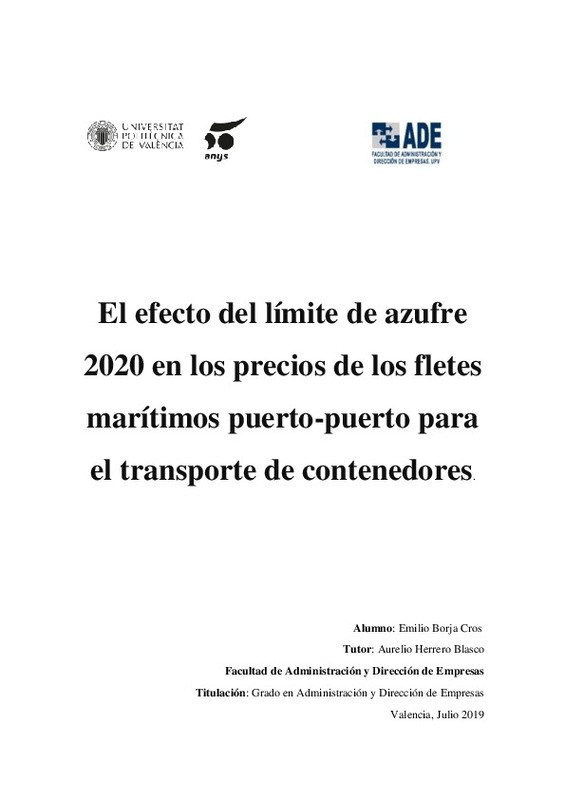JavaScript is disabled for your browser. Some features of this site may not work without it.
Buscar en RiuNet
Listar
Mi cuenta
Estadísticas
Ayuda RiuNet
Admin. UPV
El efecto del límite de azufre 2020 en los precios de los fletes marítimos puerto-puerto para el transporte de contenedores
Mostrar el registro sencillo del ítem
Ficheros en el ítem
| dc.contributor.advisor | Herrero Blasco, Aurelio
|
es_ES |
| dc.contributor.author | Borja Cros, Emilio
|
es_ES |
| dc.date.accessioned | 2019-09-02T16:54:03Z | |
| dc.date.available | 2019-09-02T16:54:03Z | |
| dc.date.created | 2019-07-23 | |
| dc.date.issued | 2019-09-02 | es_ES |
| dc.identifier.uri | http://hdl.handle.net/10251/124788 | |
| dc.description.abstract | [ES] El objeto de este TFG es ver cómo va a influir la limitación del azufre en el combustible de los barcos que a partir del 2020 va a llevarse a cabo y cómo esta limitación influirá en el precio de los fletes puerto-puerto. Los principales objetivos son: analizar la estructura del sector de transporte de contenedores por vía marítima, estudiar el flete marítimo puerto-puerto y sus componentes, analizar las directivas de la Organización Marítima Internacional, regulación actual y cambios en 2020, estudiar las posibles soluciones para adaptar los buques mercantes a las nuevas regulaciones y ver cómo se van a transferir los nuevos costes al flete marítimo puerto-puerto. A partir de enero de 2020 entrará en vigor la normativa de la Organización Marítima Internacional (IMO) sobre el límite de contenido de azufre en el combustible marítimo. Debido a las mayores restricciones, las líneas navieras portacontenedores se verán obligadas a tomar medidas con un elevado coste para adaptar su flota mercante actual a las nuevas regulaciones, lo que incrementará los costes operativos de los buques significativamente. En este proyecto se analizarán los componentes que conforman el coste del flete marítimo puerto - puerto así como los cambios de la nueva normativa que incrementarán el coste de dichos fletes; también se analizarán las diversas soluciones posibles para adaptar los barcos portacontenedores a la nueva normativa y cómo se transferirán estos costes a los usuarios de servicios de flete marítimo en contenedores. | es_ES |
| dc.description.abstract | [EN] The object of this TFG is to see how it will influence the limitation of sulphur in the fuel of ships that from 2020 is going to take place and how this limitation will influence in the price of port-port freight. The main objectives are: to analyse the structure of the container transport sector by sea, to study the port-port maritime freight and its components, to analyse the directives of the International Maritime Organization (IMO), current regulation and Changes in 2020. Study the possible solutions to adapt the merchant ships to the new regulations and see how the new costs will be transferred to the port-port sea freight. Starting January 2020 the new Global Sulfur Cap regulation implemented by the International Maritime Organization will be taking effect. Due to the increased restrictions on bunker oil sulphur content, the container shipping lines will have to take costly measures to adapt their current merchant fleet to comply with the lowered sulphite emissions limit, which is expected to increase the vessels operating costs significantly. In this project we will analyze the current state of port-port container ocean freight pricing as well as the changes to applicable regulations and determine what solutions the freight liners will implement to comply with them, with the aim to understand how will the costs of these solutions be transferred to the users of international maritime freight services. | es_ES |
| dc.format.extent | 74 | es_ES |
| dc.language | Español | es_ES |
| dc.publisher | Universitat Politècnica de València | es_ES |
| dc.rights | Reconocimiento - No comercial (by-nc) | es_ES |
| dc.subject | Logística | es_ES |
| dc.subject | Medidas anti polución | es_ES |
| dc.subject | Transporte marítimo | es_ES |
| dc.subject | Sector de transporte de contenedores | es_ES |
| dc.subject | Azufre | es_ES |
| dc.subject | Límite global de azufre | es_ES |
| dc.subject | IMO 2020 | es_ES |
| dc.subject | Flete marítimo | es_ES |
| dc.subject | Envío de contenedores | es_ES |
| dc.subject | Global sulphur cap | es_ES |
| dc.subject | Ocean freight pricing | es_ES |
| dc.subject | Bunker fuel costs | es_ES |
| dc.subject.classification | ORGANIZACION DE EMPRESAS | es_ES |
| dc.subject.other | Grado en Administración y Dirección de Empresas-Grau en Administració i Direcció d'Empreses | es_ES |
| dc.title | El efecto del límite de azufre 2020 en los precios de los fletes marítimos puerto-puerto para el transporte de contenedores | es_ES |
| dc.type | Proyecto/Trabajo fin de carrera/grado | es_ES |
| dc.rights.accessRights | Abierto | es_ES |
| dc.contributor.affiliation | Universitat Politècnica de València. Facultad de Administración y Dirección de Empresas - Facultat d'Administració i Direcció d'Empreses | es_ES |
| dc.contributor.affiliation | Universitat Politècnica de València. Departamento de Organización de Empresas - Departament d'Organització d'Empreses | es_ES |
| dc.description.bibliographicCitation | Borja Cros, E. (2019). El efecto del límite de azufre 2020 en los precios de los fletes marítimos puerto-puerto para el transporte de contenedores. http://hdl.handle.net/10251/124788 | es_ES |
| dc.description.accrualMethod | TFGM | es_ES |
| dc.relation.pasarela | TFGM\108352 | es_ES |
Este ítem aparece en la(s) siguiente(s) colección(ones)
-
ADE - Trabajos académicos [3699]
Facultad de Administración y Dirección de Empresas






